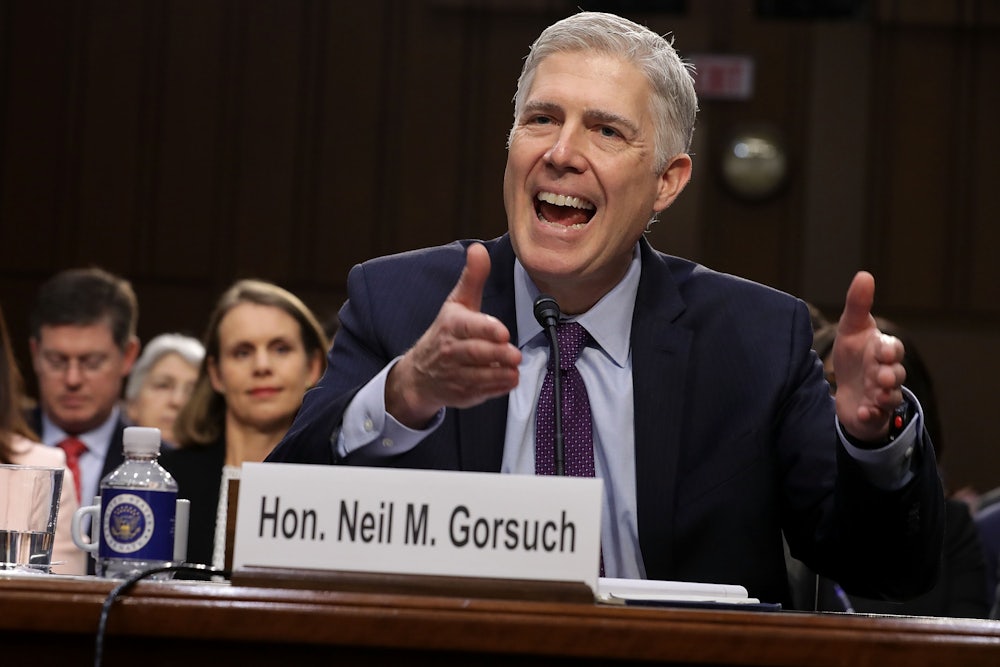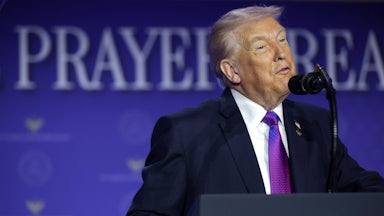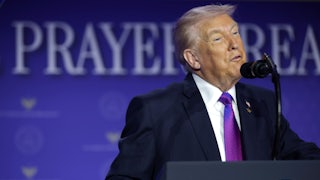In June the Supreme Court took an ax handle to federal regulatory agencies in Loper Bright v. Raimondo and SEC v. Jarkesy. Both decisions were written by Chief Justice John Roberts, but cutting the administrative state down to size is especially dear to the heart of Associate Justice Neil Gorsuch, so he wrote concurring opinions in each case, taking the anti-regulatory argument a bit further than the majority. Now Gorsuch has folded a sort of Classics Illustrated version of those opinions into a new book, Over Ruled: The Human Toll of Too Much Law.
Gorsuch’s target is bigger than just the regulatory state. As the title suggests, Gorsuch is troubled by a proliferation of laws criminalizing all sorts of activities that previously were legal. Much of Gorsuch’s criticism on this score is perfectly sound. The number of federal crimes nearly doubled over the past four decades, from about 3,000 to more than 5,000. A parallel proliferation occurred at the state level. Even Gorsuch’s liberal colleague, Associate Justice Elena Kagan, acknowledges the problem of “overcriminalization and excessive punishment in the U.S. code.”
By one estimate, writes Gorsuch, “70 percent of adult Americans today have committed an imprisonable offense.” Gorsuch doesn’t spell this out (probably because it wouldn’t play well with his conservative audience), but the bulk of these were possession of marijuana. Nor does Gorsuch dwell on the apparent racial motivation behind much over-criminalization. Between 2010 and 2018, African Americans were nearly four times more likely to be arrested for marijuana than white people. As Michelle Alexander famously argued in her 2010 book, The New Jim Crow (uncited in Over Ruled), mass incarceration is “a well-disguised system of racialized social control.” Gorsuch can be faulted for underplaying the racial subtext, but his nonracial examples of over criminalization are often enraging too. In one case that came before Gorsuch when he was a judge on the Tenth Circuit, a 13-year-old who disrupted class “with a cascade of burps” got busted for violating a state law against “interfer[ing] with the educational process.” The Tenth Circuit upheld the arrest, with Gorsuch dissenting.
But in Over Ruled Gorsuch conflates over-criminalization with what he perceives to be overregulation. Criminal law and regulation are different in important ways, not least that a bad criminal law can send you to jail, whereas a bad regulation (and yes, there are some) will typically sock you only with a financial penalty. Another key difference is that, unlike the criminal justice system, the administrative state is concerned primarily with checking corporate power. In a book filled to the brim with colorful anecdotes, not one tells the story of a business of any notable size or an individual of any significant wealth that challenged the legitimacy of a federal regulation. It’s like a retelling of “Little Red Riding Hood” from which the Big Bad Wolf has been neatly excised.
Who do we get instead? Marty the Magician. Marty, whose real name is Marty Hahne, used to pull a live rabbit out of his hat as part of his magic show. At a 2005 gig in Missouri, an Agriculture Department official demanded to see his license. Under the law, dealers of warm-blooded animals used in laboratory research and “exhibitors” such as “carnivals, circuses, and zoos” are required to hold licenses, submit to periodic surprise inspections, and draw up a plan in the event of a natural disaster. Gorsuch makes it sound as though classifying a solitary magician as an “exhibitor” was regulatory overreach. But any overreach that existed was written directly into the statute, which defined “exhibitor” very broadly as
any person (public or private) exhibiting any animals which were purchased in commerce or the intended distribution of which affects commerce or will affect commerce to the public for compensation.
The statute mentioned “carnivals, circuses, and zoos” merely as examples and explicitly exempted pet stores, county fairs, livestock shows, rodeos, pure-bred dog and cat shows—but not magic shows. Should the Agriculture Department have exempted from its regulation small operators like Marty the Magician? Yes, and eventually it did, allowing exhibitors up to eight animals before the regulation kicked in. That happened after David Farenthold wrote up Marty’s plight in The Washington Post, and Fox News’s John Stossel interviewed Marty for a feature about “the war on the little guy,” and former Missouri Senator Claire McCaskill raised hell. But had the Agriculture Department imposed a size limit on exhibitors from the start, that would have departed from the statute, which is precisely what anti-regulatory critics like Gorsuch identify as the administrative state’s besetting sin.
I might add that the regulatory burdens imposed on Marty before the Agriculture Department relented, though silly, were hardly overwhelming; the license fee, for example, was $40 annually. When I phoned Marty to check out Gorsuch’s story he told me he doesn’t perform anymore with his rabbit, but not because of regulations; rather, the rabbit is getting on in years (she’s 13).
Here’s an anecdote you won’t find in Gorsuch’s book: George Jarkesy Jr., is a hedge fund manager and conservative talk-show host. He allegedly told brokers and investors that his funds were audited by KPMG and that their prime broker was Deutsche Bank. Neither was true, and the Securities and Exchange Commission nailed him for fraud. Jarkesy, who is worth perhaps a billion dollars, was required by the SEC to pay a fine of $300,000, to turn over an additional $685,000 in illegitimate revenue, and to absent himself from the securities industry for the remainder of his life.
Jarksey appealed, claiming that the SEC administrative law proceeding that imposed these penalties deprived him of his right to a jury trial under the Seventh Amendment. Incredibly, the Supreme Court agreed with him. In his concurring opinion, Gorsuch wrote that in addition to violating the Seventh Amendment, the SEC’s actions also violated the Constitution’s Article 3, which vests judicial power in the courts, and the due process clause of the Fifth Amendment. “People like Mr. Jarkesy may be unpopular,” Gorsuch wrote.
Perhaps even rightly so: The acts he allegedly committed may warrant serious sanctions. But that is not what is at stake in this case and others like it. While incursions on old rights may begin in cases against the unpopular, they rarely end there.
Reality check: It’s the rare proletarian who gets investigated by the SEC. Jarkesy’s was a routine case of regulatory enforcement of the type the administrative state has been performing since Walter Winchell ruled the airwaves. Most of the relatable victims whose stories Gorsuch tells in Over Ruled never landed in the kind of trouble Jarkesy did, and they came out more or less intact from their tangles with the administrative state.
Do regulatory agencies make mistakes? Of course they do, and when they do those mistakes ought to be corrected. But doctrinaire enemies of the administrative state aren’t fighting for the Marty Hahnes. They’re fighting for the George Jarkesys. Whether that’s true of Gorsuch I can’t say, but at the very least Gorsuch is fighting for judges like himself to determine the Jarkesys’ fate. The last term’s war on regulatory power was, as Associate Justice Sonia Sotomayor noted in her dissent in SEC v. Jarkesy, “a power grab” that “prescribes artificial constraints on what modern-day adaptable governance must look like.” Over Ruled may present itself as a book about the law, but it’s really a book about power. It’s an argument for taking power away from the administrative state and giving it to judges instead.








